中学英语教案 模板合集
九年级英语备课教案大全5篇
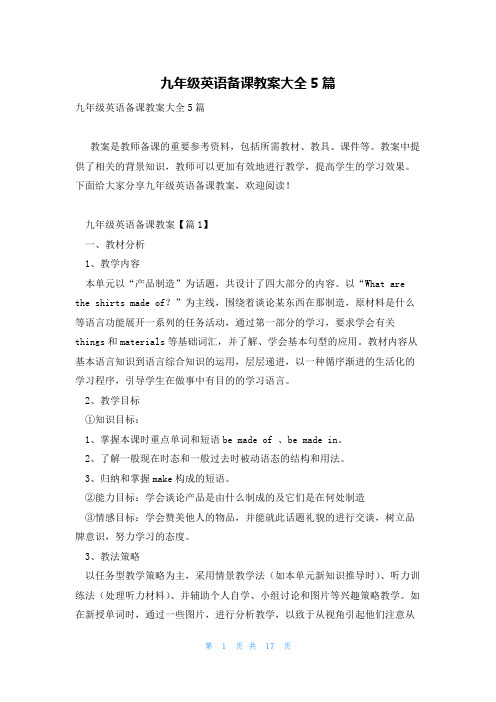
九年级英语备课教案大全5篇九年级英语备课教案大全5篇教案是教师备课的重要参考资料,包括所需教材、教具、课件等。
教案中提供了相关的背景知识,教师可以更加有效地进行教学,提高学生的学习效果。
下面给大家分享九年级英语备课教案,欢迎阅读!九年级英语备课教案【篇1】一、教材分析1、教学内容本单元以“产品制造”为话题,共设计了四大部分的内容。
以“What are the shirts made of?”为主线,围绕着谈论某东西在那制造,原材料是什么等语言功能展开一系列的任务活动,通过第一部分的学习,要求学会有关things和materials等基础词汇,并了解、学会基本句型的应用。
教材内容从基本语言知识到语言综合知识的运用,层层递进,以一种循序渐进的生活化的学习程序,引导学生在做事中有目的的学习语言。
2、教学目标①知识目标:1、掌握本课时重点单词和短语be made of 、be made in。
2、了解一般现在时态和一般过去时被动语态的结构和用法。
3、归纳和掌握make构成的短语。
②能力目标:学会谈论产品是由什么制成的及它们是在何处制造③情感目标:学会赞美他人的物品,并能就此话题礼貌的进行交谈,树立品牌意识,努力学习的态度。
3、教法策略以任务型教学策略为主,采用情景教学法(如本单元新知识推导时)、听力训练法(处理听力材料)、并辅助个人自学、小组讨论和图片等兴趣策略教学。
如在新授单词时,通过一些图片,进行分析教学,以致于从视角引起他们注意从而记住单词。
采取任务型教学策略的目的是主要是让学生多练多用,在做中学、学中乐、乐中掌握。
4、学习策略采用合作式学习方式,有目的的让学生预习,在完成任务的活动中主动的学习语言,养成继续学习英语和学好英语的良好习惯。
强调学生不仅要在课上积极发言、多练,并鼓励他们课后积极进行英语学习、积极参加训练。
二、重难点分析重点词汇通过图片和对话解决。
如:chopsticks,coin,blouse,silver,ilk,be made of等。
英语教学教案模板英文版(10篇)

英语教学教案模板英文版(10篇)英语优秀教学设计篇一英语优秀教学设计篇二英语教案篇三标准英语教案篇十课前预备1、教学挂图。
2、教学投影片。
3、教学录音磁带。
4.6个地点场所的图片及单词卡片(师生各自预备)。
5、第25课交通工具及交通设施图片及单词卡片(师生各自预备)。
6、嬉戏用汽车站牌、交通工具头饰、售票员胸牌、乘车票等。
教学内容A Look, listen and talk.1、本局部利用图画引入单词。
2、学生通过看、听、说,学习5个地点场所的英文表达。
其中school 和zoo两个单词虽然在以前的学习中接触过,但是并未作为正式的单词消失过,此次正式列入生词表中,作为生词消失。
3、本局部单词的要求是:学生能将单词的音和相应的图形联系起来,并能看图用英文说出单词。
4、本局部学习内容的难点如下:(1)book store词组中失去爆破的读音;(2)地点及场所单词词义的识别。
5、初步练习用“Where are you going? Im going to.。
.。
”语句,询问某人要去哪儿和表达自己要去的地方。
6、初步练习询问某人乘坐什么交通工具并能答复。
7、本局部重点学习地点及场所单词的音、形、义/对语句的学习仅要求能初步感知,在B局部教学中应留意进展语句的稳固练习。
8、本局部能够涉及到的复习内容是:询问某物在哪儿的语句及表示方位的词。
此项复习内容为第27课学习指路和问路做了铺垫。
B Lets play and say.1、本局部的学习内容是学生通过嬉戏的方式进展模拟角色表演。
2、学生通过用语言做事情,娴熟把握所学地点场所的单词和询问某人要去哪儿的问答语。
3、本局部有一首关于开着车去某地方的。
歌曲,此歌曲协作学生模拟活动,不要求学生会唱,可以在今后的复习稳固中要求学生逐步学会此歌曲。
教学建议1、学生在学习新内容之前,教师应帮忙学生对第25课的学习内容进展复习。
2、教师出示教学挂图,请学生看图并听录音。
初中英语教案模板(优秀8篇)
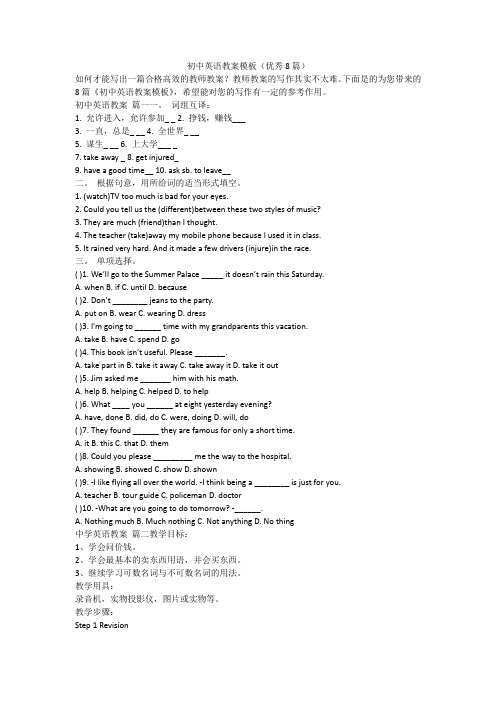
初中英语教案模板(优秀8篇)如何才能写出一篇合格高效的教师教案?教师教案的写作其实不太难。
下面是的为您带来的8篇《初中英语教案模板》,希望能对您的写作有一定的参考作用。
初中英语教案篇一一。
词组互译:1. 允许进入,允许参加_ _2. 挣钱,赚钱___3. 一直,总是_ __4. 全世界_ __5. 谋生_ __6. 上大学___ _7. take away _ 8. get injured_9. have a good time__ 10. ask sb. to leave__二。
根据句意,用所给词的适当形式填空。
1. (watch)TV too much is bad for your eyes.2. Could you tell us the (different)between these two styles of music?3. They are much (friend)than I thought.4. The teacher (take)away my mobile phone because I used it in class.5. It rained very hard. And it made a few drivers (injure)in the race.三。
单项选择。
( )1. We’ll go to the Summer Palace _____ it doesn’t rain this Saturday.A. whenB. ifC. untilD. because( )2. Don’t ________ jeans to the party.A. put onB. wearC. wearingD. dress( )3. I’m going to ______ time with my grandparents this vacation.A. takeB. haveC. spendD. go( )4. This book isn’t useful. Please _______.A. take part inB. take it awayC. take away itD. take it out( )5. Jim asked me _______ him with his math.A. helpB. helpingC. helpedD. to help( )6. What ____ you ______ at eight yesterday evening?A. have, doneB. did, doC. were, doingD. will, do( )7. They found ______ they are famous for only a short time.A. itB. thisC. thatD. them( )8. Could you please _________ me the way to the hospital.A. showingB. showedC. showD. shown( )9. -I like flying all over the world. -I think being a ________ is just for you.A. teacherB. tour guideC. policemanD. doctor( )10. -What are you going to do tomorrow? -______.A. Nothing muchB. Much nothingC. Not anythingD. No thing中学英语教案篇二教学目标:1、学会问价钱。
初中优秀英语教案范文5篇
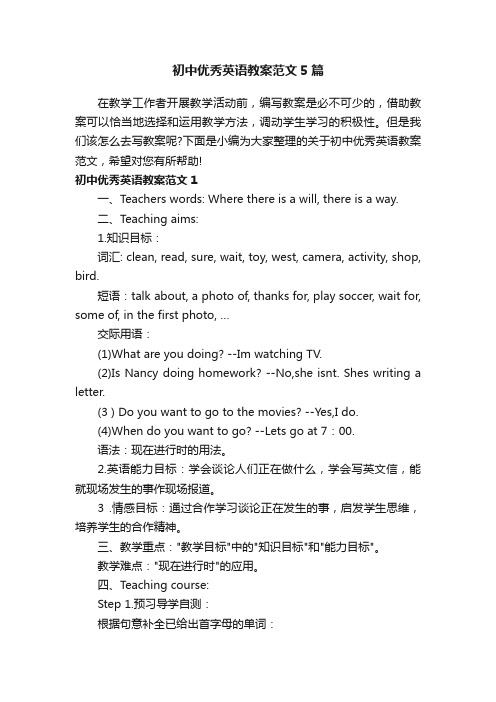
初中优秀英语教案范文5篇在教学工作者开展教学活动前,编写教案是必不可少的,借助教案可以恰当地选择和运用教学方法,调动学生学习的积极性。
但是我们该怎么去写教案呢?下面是小编为大家整理的关于初中优秀英语教案范文,希望对您有所帮助!初中优秀英语教案范文1一、Teachers words: Where there is a will, there is a way.二、Teaching aims:1.知识目标:词汇: clean, read, sure, wait, toy, west, camera, activity, shop, bird.短语:talk about, a photo of, thanks for, play soccer, wait for, some of, in the first photo, …交际用语:(1)What are you doing? --Im watching TV.(2)Is Nancy doing homework? --No,she isnt. Shes writing a letter.(3 ) Do you want to go to the movies? --Yes,I do.(4)When do you want to go? --Lets go at 7:00.语法:现在进行时的用法。
2.英语能力目标:学会谈论人们正在做什么,学会写英文信,能就现场发生的事作现场报道。
3 .情感目标:通过合作学习谈论正在发生的事,启发学生思维,培养学生的合作精神。
三、教学重点:"教学目标"中的"知识目标"和"能力目标"。
教学难点:"现在进行时"的应用。
四、Teaching course:Step 1.预习导学自测:根据句意补全已给出首字母的单词:1、My little brother is w_____ a letter.2、The students are c_____ the classroom.3、The boy is taking a photo with a c______.4、Are they w_____ for a bus over there?5、Hes r_____ a newspaper.小小翻译家:1、talk about________2、a photo of________3、wait for________4、in the first photo________5、电话交谈________6、踢足球________7、因…而感谢________ 8、许多图书馆_______Step2情境导入Look at the pictures in P25 1a and write sentencesNow its 6:00 pm. What are they doing?In picture A. She is talking on the phone.In picture B. ________________________In picture C. ________________________In picture D. ________________________In picture E. ________________________In picture F. ________________________Step3自主探究1.以上练习的句子是什么时态?_______________________________.2.该时态的结构是_________________________________________.3.现在分词的构成规则A、一般直接在动词后加______,如reading,watch_____, talk____ .B、以字母不发音的e结尾的____________,如writing,come_______, make ____ .C、一个元音字母加一个辅音字母结尾且末尾只有一个辅音字母的重读闭音节词要_____________________ 。
版初中英语教案全英文【8篇】

版初中英语教案全英文【优秀8篇】最新初中英语教案篇一一、教学目标在本节课结束时,学生将能够:用正确的语言谈论如何学习;用by+ doing的结构描述自己的学习方式;能够就英语学习与他人进行简单的口语交流。
知识与能力:通过本课学习,用目标语言谈论如何学习英语,就英语问题进行简单的沟通,同时在与他人的合作与交流中帮助他人,树立自己学习的信心。
过程与方法:采用小组合作探究、听力练习、对话练习、猜测问题和角色互换的学习策略,利用视频、PPT和制作课件等来展开课堂教学环节等,进行“询问和谈论学习方法、解决困惑” 的课堂教学和练习。
本单元的教学法建议:短语教学——采取情景引入展开启发式的教学方式,让学生在思考中输出自己的语言,并在句型中学会运用;语音教学——让学生进行听对话并跟读听力材料;口语教学——采取对话练习和角色互换对学生进行教学;听力教学——采取听音配对、听音打钩和听音对应等的方式进行听力教学和听力技巧指导;口语教学——通过创设情境让学生进行对话练习和角色互换活动,来进行语言的输出。
情感态度与价值观:通过参与课题教学活动,增进同学之间的了解和友情,并在交流中了解英语学习的方法,建立学习英语的自信。
二、教学重难点教学重点:学习并掌握How do you study...? I study...by ....等相关句型和词汇。
学习并掌握用by + doing 结构表达方式方法。
教学难点:学习并用丰富的语言描述英语学习的方式和方法。
三、教学策略短语教学——采取视频引入话题然后进行启发式教学,并在对话中运用;语音教学——让学生跟读听力材料进行模仿式操练;口语教学——采取pair work 和Role- play问答式的口语交际活动或小组活动互相操练;听力教学——采取采取听音配对、听音打钩和听音对应等方式语法教学——通过模仿听力材料进行对话练习,在教师的纠正中培养正确的by + doing 的结构意识。
初中英语公开课教案篇二课前准备教师:准备游戏时所用的图片(食物、蔬菜、动物)。
初中英语优秀教案模板范文(汇总12篇)

初中英语优秀教案模板范文(汇总12篇)(经典版)编制人:__________________审核人:__________________审批人:__________________编制单位:__________________编制时间:____年____月____日序言下载提示:该文档是本店铺精心编制而成的,希望大家下载后,能够帮助大家解决实际问题。
文档下载后可定制修改,请根据实际需要进行调整和使用,谢谢!并且,本店铺为大家提供各种类型的经典范文,如工作总结、工作计划、合同协议、条据文书、策划方案、句子大全、作文大全、诗词歌赋、教案资料、其他范文等等,想了解不同范文格式和写法,敬请关注!Download tips: This document is carefully compiled by this editor. I hope that after you download it, it can help you solve practical problems. The document can be customized and modified after downloading, please adjust and use it according to actual needs, thank you!Moreover, our store provides various types of classic sample essays for everyone, such as work summaries, work plans, contract agreements, doctrinal documents, planning plans, complete sentences, complete compositions, poems, songs, teaching materials, and other sample essays. If you want to learn about different sample formats and writing methods, please stay tuned!初中英语优秀教案模板范文(汇总12篇)初中英语优秀教案模板范文第1篇教学目标:1、能听懂、会说、会读、会拼写词汇look for, join, study.2、能听懂、会说、会读日常交际用语和句型Classes are over.Perhaps they are.I’ll go and join them.Where are you going? I’m going to …3、培养学生乐于助人的良好思想品质。
初中英语教案设计模板全英文版
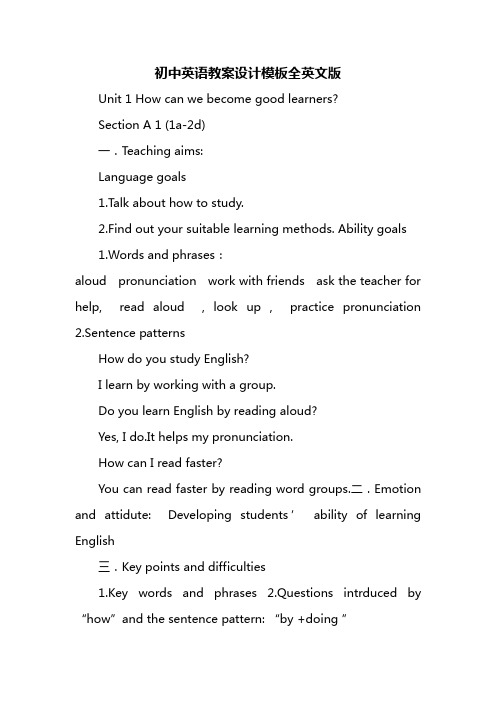
初中英语教案设计模板全英文版Unit 1 How can we become good learners?Section A 1 (1a-2d)一.Teaching aims:Language goals1.Talk about how to study.2.Find out your suitable learning methods. Ability goals1.Words and phrases:aloud pronunciation work with friends ask the teacher for help, read aloud , look up , practice pronunciation 2.Sentence patternsHow do you study English?I learn by working with a group.Do you learn English by reading aloud?Yes, I do.It helps my pronunciation.How can I read faster?You can read faster by reading word groups.二.Emotion and attidute: Developing students’ability of learning English三.Key points and difficulties1.Key words and phrases2.Questions intrduced by “how”and the sentence pattern: “by +doing ”四.Teaching procedures: Step 1 Warming upT: How do you study English? Do you study English by the following ways? (Show some pictures and present the important phrases.)T: How do you study English? S: I study English by ______.by working with friends.by making word cards.by asking the teacher for help.by reading the textbook.by working with a group.by listening tapes.Step 2 1a Check the ways you study English.Then add other ways you sometimes study.___ a.by working with friends.___ b.by making word card.___ c.by reading the textbook.___ d.by listening to tapes ___ e.by asking the teacher for help.…Step 3 Listening1) Listen.How do these students study for a test? Write letters from 1a above.2) Check the answers: b (Meiping); e (Peter); d (Tony) Step 4 Gue Show some pictures.Gue: How does he/she study English? He/She studies English by…How do they study English? They study English by… Step 5 Pairwork1c Make conversations about how you study for a test.A: How do you study for a test?B: I study by working with a group.A: How do you study for a test?B: I study by… Step 6 Listening2a Listen and check the questions you hear.1 ____ Does anyone learn English by watching videos? 2 ____ Do you have conversations with friends in English? 3 ____ What about listening to tapes? 4 ____ What about reading aloud to practice pronunciation? 5 ____ Have you ever studied with a group?Answers: 1, 2, 4, 5 2b Listen again.Match each answer below with a question above.a.Yes, I have.I’ve learned a lot that way.b.Oh, yes.It really improves my speaking skills.c.I do that sometimes.I think it helps.d.No.It’s too hard to understand spoken English.Answers: d, b, c, a Step 7 Pairwork 1.2c Make conversations using the information in 2a and 2bA: Have you ever studied with a group?B: Yes, I have.I’ve learned a lot that way.Show some pictures.1) A: Do you learn English by watching movies?B: Yes, it’s a very interesting way.C: No, it’s too hard to understand spoken English.2) A: What about writing letters to a pen pal in America?B: Yes, it helps to improve my writing skills and know a lot aboutAmerica.3) A: Do you have conversations with friends in English?B: Of course, we can talk about plenty of things like school, pets,movies, and our parents.Step 8 SummaryHow do you study English?1.by working with friends2.by watching English movies.3.by making word cards.4.by reading the textbook.5.by listening to tapes.6.by asking the teacher for help.7.by reading aloud.Step9 Homework How do you study English? What about physics and Chinese? Make a list.Oral Presentation of Leon Plan for Unit 12 My favorite subject is science Go for it Grade 7(注:本说课稿根据“2007年首届全国中学英语教师教学基本功大赛暨教学观摩研讨会(初中)”)[Presenting the 1st PPT about the introduction.] Well,good afternoon ladies and gentlemen, I am very happy to meet you all here.Today,I am going to present Unit 12 Writing.Well, please look at the teaching material together.Well, this is a letter in the book.Students are required to read it through, have a look at it, try to write a letter to Zhao Jie, a boy who doesn’t like any subjects at all.[Presenting the 2nd PPT about the given letter.]Well, I think my teaching aims should include the proper form of English letter, and second, how to write a letter in an idiomatic way.[Presenting the 3rd PPT about the teaching aims.]Well, to achieve these goals, I am going to arrange my teaching step by step [Presenting the 4th PPT about the teaching procedures].Well, these are the steps, since so many, let me make it simple, actually, they are words, sentences and paragraphs.As we know that articles consist of words and sentences.So first, I would like to talk about the words.That is also the first step---revision.Well, you know, students have learned the names of the subjects in the former leons.So, I am going to review the words by playing games with them.Here comes the first game: who can write more? [Presenting the 5th PPT about the 1st game]I am going to divide the students into two groups, for example boys and girls.They are given twominutes to rush to the blackboard and write down the subjects they know.The group which can write more will be the winner.Imagine how excited the students are, and at the same time, they are also reviewing the words.Well, what’s more, you may have noticed these two subjects, Physics and Chemistry.[Presenting the 6th PPT about the result of the game] Actually, these two subjects are not in this book.So, in this way, we can know that some students are showing us how much they know and all the students can also enlarge their vocabulary at the same time.Well, after words, I would like to turn to sentences.Here comes the second game, who can make it longer? [Presenting the 7th PPT about the 2nd game] I am going to give students a word, for example subject.Which students can make it longer? Well, you please.Favorite subject.Good.A phrase appears.Longer? You please.My favorite subject is English.Well, a sentence appears.Even longer? My favorite subject is English, I like it very much, it is so interesting.[Presenting the 8th PPT about the answers of the game]Well, you can see students are constructing words into sentences step by step.Well, this is the revision part.After that, it is time to read.From now, I am going to show students the given material so soon.Actually, instead, I am going toshow them those separated pieces.They should put them into the correct order[Presenting the 9th PPT about the reordering task].You know before the leon, I divided the whole letter into these four parts, why do I bother to do this? Well, you can see, in this way, students can put more attention to how to begin and how to end a letter.Then, they have a time, can have a chance to read through the whole article[Presenting the 10 th PPT about the reading material].Well, at the same time, they should also pick out those well used words and sentences, and share them with the whole cla.Then, they have a discuion “what information can we use? [Presenting the 11th PPT about the discuion task]Why talking about subjects? Of course, it is easy for them to find these information like these three ones ( time Additional material(The new Star Wars movie, Be Careful with Numbers) Teaching Objectives: Knowledge objectives: To enable students to listen and complete some exercises Ability Objectives: To encourage the students to have basic skills of listening.Emotion objectives: To cultivate the cooperation through peer interaction Teaching aids: Multi-media Teaching and learning method: Guiding for learning Teaching Procedures: I.Presentation Today we¡¯ll ha ve a cla on listening practice ¡°Be careful with numbers inlistening¡±: First we¡¯ll play a game.Then, we¡¯ll practice.Lead-in A game on number II.Performance: Quick and accurate response to numbers is very important in daily communication.Telephone numbers, addrees, prices, temperatures, time and dates all closely linked with the use of numbers .Besides, numbers also play a very important part in broadcast programmes such as reports Now let¡¯s listen to some advice from experts.Task 1 Be Careful with Numbers (Play the recorder Twice) Individual work¡úpair work(check the answer with your partner)¡úGroup work(Underline the important sentences.e.g.The differences between million and billion, ¡°-teen¡¯s¡± and ¡°-ty¡¯s¡± are ¡-..¡°Seventeen point five million.¡±¡-)Whole cla read the key sentences. Well-done! Numbers are all around us.Let us practice with numbers and learn to be good at numbers.(First read out the following numbers¡- Watch the screen) T ask 2 Listen to some statements about the brief history of films and TV.First check the answers in groups.If you have different opinion , please raise your hands.Judgement: (First students give themselves a judge.Then teacher does it) It seems no challenge.Now, We¡¯ll do challenge exercise.So pay special attention to the numbers in the paage and select the correct answer from the choiceslisted below.First teach the students new words in listening material.Then ask students to read out the numbers in Star Wars.III.Promotion: Challenge exercise Star Wars Listen to the tape twice ¡úCheck the answers IV.Conclusion: What we learned today is ¡°Be careful with numbers in numbers.¡± Remember the following points when you are doing listening tasks: 1.Take great care with the spelling of names and with addrees and phones numbers, prices, time and dates...2.To find the right answer, you may need to do simple calculations or combine two sets of data.3.Listen carefully for words and phrases such as these: half / twice as expensive as¡- it¡¯s shorter / cheaper / quicker than¡- the lightest / heaviest / newest not as long / cheap / good as¡- Some useful abbreviations and symbols for note taking( See PPt.) V.Aignment: 1.Review P6-7 ¨CFilling in forms P43¨C Working with numbers 2.Collect some information on listening skills Teaching Plan Be Careful with Numbers in Listening Cla: Cla 12, Senior Two Date: May 16,2007 Teacher: Ni Yazhen School: Zhi Yuan Senior High School Teaching Material: P75 S2B Oxford English; Additional material(The new Star Wars movie, Be Careful with Numbers) Teaching Objectives: Knowledge objectives: To enable students to listen andcomplete some exercises Ability Objectives: To encourage the students to have basic skills of listening.Emotion objectives: To cultivate the cooperation through peer interaction Teaching aids: Multi-media Teaching and learning method: Guiding for learning Teaching Procedures: I.Presentation Today we¡¯ll have a cla on listening practice ¡°Be careful with numbers in listening¡±: First we¡¯ll play a game.Then, we¡¯ll practice.Lead-in A game on number II.Performance: Quick and accurate response to numbers is very important in daily communication.Telephone numbers, addrees, prices, temperatures, time and dates all closely linked with the use of numbers .Besides, numbers also play a very important part in broadcast programmes such as reports Now let¡¯s listen to some advice from experts.Task 1 Be Careful with Numbers (Play the recorder Twice) Individual work¡úpair work(check the answer with your partner)¡úGroup work(Underline the important sentences.e.g.The differences between million and billion, ¡°-teen¡¯s¡± and ¡°-ty¡¯s¡± are ¡-..¡°Seventeen point five million.¡±¡-)Whole cla read the key sentences. Well-done! Numbers are all around us.Let us practice with numbers and learn to be good at numbers.(First read out the following numbers¡- Watch the screen) T ask 2 Listen to some statementsabout the brief history of films and TV.First check the answers in groups.If you have different opinion , please raise your hands.Judgement: (First students give themselves a judge.Then teacher does it) It seems no challenge.Now, We¡¯ll do challenge exercise.So pay special attention to the numbers in the paage and select the correct answer from the choices listed below.First teach the students new words in listening material.Then ask students to read out the numbers in Star Wars.III.Promotion: Challenge exercise Star Wars Listen to the tape twice ¡úCheck the answers IV.Conclusion: What we learned today is ¡°Be careful with numbers in numbers.¡± Remember the following points when you are doing listening tasks: 1.Take great care with the spelling of names and with addrees and phones numbers, prices, time and dates...2.To find the right answer, you may need to do simple calculations or combine two sets of data.3.Listen carefully for words and phrases such as these: half / twice as expensive as¡- it¡¯s shorter / cheaper / quicker than¡- the lightest / heaviest / newest not as long / cheap / good as¡- Some useful abbreviations and symbols for note taking( See PPt.) V.Aignment: 1.Review P6-7 ¨CFilling in forms P43¨C Working with numbers 2.Collect some information on listening skillsTeaching Plan ----Yang Xuefen Content: Unit 4 He said I was hardworking.>, Grade 8(¢ò) Time: March 12th, the 1st period, Place: Cla 6, Grade 8Teaching goals: 11.Knowledge goal: 1.Vocabulary: hard-working, be mad at, not---anymore 2.Patterns: What did Marcia say? She said she was she was having a party for Lanna.22.Ability goal: Learn to report what someone said correctly 33.Moral goal: To teach students not to report wrong meage or they may cause trouble.To be an honest and good kid, report what someone said correctly.Teaching aids: multi-mediaTeaching procedures: Step 1: Leading in by free talking with the students: Ask several Ss what they are going to do after school .Write their sentences on the Bb.How are you? How is your mother? What are you doing? What is your mother doing? What do you do in the morning? What about your mother? What are you going to do after school? What is your mother going to do after work? I¡¯m fine.My mother is fine.I¡¯m having a cla.My mother is working.I have leons in the morning? My mother works in the morning.I am going to play sports after school My mother is going to cook after work.Step 2: Pre-task T: Now I¡¯m going to report what xx saidto you: xx said he was fine.And he said his mother was fine, too.He said he was having a cla and his mother was working.He said he had leons in the morning and his mother worked in the morning.He said he was going to play sports after school.He said his mother was going to cook after work.Step 3: While-task 1.Observe the sentences on the blackboard, find out what is different in my report He/ She said--------.4.SBp26/1a: Write the words soap opera on the board.Point to the picture and ask students what they think a soap opera is.Point out the TV screens in the picture.Ask one student to read what the person says in the first picture .Then ask another student: What did she/he say? Help to answer: She/He said she/he was having a surprise party for Lana on Friday night.6.Repeat with the other pictures.SB Page 26 , 1b .Listen and Number the pictures.SB Page 27 , 2a students try to find out the right picture and say the name in English.Step 2 Lead-in 1.Free talk: (1) What is your star sign? (2) Can you tell me something about yourself? ( abilities, special qualities, characteristics) (3) How many students are under the same star sign as you? (Yesterday¡¯s homework) (4) What are they like? (clever, kind, generous, hard-working, brave, patient, polite¡-.) (5) Do you share similar characteristics? (Letstudents speak out as many adjectives about characters as poible.) 2.Do you know these words? They are also used to describe people.(T each the new words, and finish Exercise B on P10.) 3.Read the new words after the teacher.Then let students read the sentences by themselves.4.Do some more exercises to see if students have known all the words¡¯ meanings.Step 3 Reading 1.T: It¡¯s said that star signs can represent a person¡¯s characteristics.Let¡¯s check if it is true.Please listen to the tape and learn something about them.2.Reading task 1: After listening to the tape, do ¡°T¡± or ¡°F¡± questions.3.Reading task 2: Ask students some questions to check if they have known the main idea, with the books open.(1) Is Aries lazy? (2) Which star sign likes saving money? (3) Does Sagittarius like telling jokes? (4) Which star sign has the best imagination? (5) If your birthday is on 13th September, what is your star sign?4.Make students read the article paage by paage and try to find out the adjectives to describe people¡¯s characteristics with the picture of each star sign.(Esp.their own star sign) T: Whose star sign is Aries? When is your birthday? What characteristics do you have/ do this star sign have?Aries: energetic, active, impatient, selfish Taurus: stubborn, hard-working, patient Gemini: curious, clever, outgoing Cancer:kind Leo: strong, confident, generous Virgo: modest, practical Libra: polite, fair, elegant Scorpio: powerful, silly Sagittarius: humorous, lucky Capricorn: succeful, patient Aquarius: kind, wise, strange Pisces: generous, kind, gentle, easy-going, creative, imaginative5.Discuion: What is your star sign? Do you have the same characteristics as the star sign says? Do you think what the star signs say about people are facts? -- So we can have a conclusion: What the star signs say about people are not facts.We can just learn about star signs for fun.Step 4 Some More Exercises 1.What are your characteristics? Write a short description of your own characteristics.2.Then show your description to your partner.3.Discu with your partner whether or not you agree with each other.Step 5 Homework 1.Read the paage three times.2.Remember all the adjectives which describe a person¡¯s characteristics.Step 1 Revision 1.Ask students some questions while showing Picture 1.(1) How many star signs are there in a year?(2) How do you know your star sign? What decides your star sign? (3) Do the people under the same star sign share similar characteristics? (4) What characteristics do the people under your star sign have? 2.Explain the language points whileanswering the above questions.1) A year is divided into 12 different star signs.2) Your date of birth decides your star sign.3) People born under the same star sign share similar characteristics.3.Ask more questions about Reading 1) Which star sign doesn¡¯t give up easily? 2) Which star sign loves peace and doesn¡¯t like to argue with others? 3) Whic h star sign is suggested to forgive others for their mistakes? 4) Which star sign likes to dream about everything? 4.T each the language points by answering the above questions.(1) You are patient and do not give up easily.(2) You love peace and do not like to argue with others.(3) Sometimes it is silly of you not to forgive others for their mistakes.(4) You like to dream about everything.Step2 Group work 1.Show students some pictures and paages about some famous people.Let students gue what star signs they are? 2.Finish Part C2 on Page11, and then check the answers.3.Discuion: What kind of friend do you like to make? (Why?) What is his/her star sign? (Let students talk about his or her own characteristics and his or her friend¡¯s.)4.What star signs are suitable for these jobs? Why? Step 4 Conclusion What star signs say about people are not facts.We should work hard to make our dream come true.Step 5 Homework 1.Read the paage again and again.2.Do someexercises.初中英语教案设计Unit 1 Have you ever eneterd a competition? 教学内容:1.让学生学习和掌握现在完成时的用法 2.教学生学习新词汇,句型和语法3.解释并举例说明现在完成进行时主要形式【have/has V-ed】教学目标1.词汇和短语experience,ever,competition,airport,capta-in ,country,take off,come true,more than e.g.2.关键句: Has she visited China before? -No,she hasn’t.But I sent her a DVD and she’s watchd it.Have you ever entered a competition? -No,I haven’t.What do you reakon? It sounds brilliant! 3.学习和掌握语法;The present perfect tense 教学重点1.Words:cabin, stewad, reckon, brillnt2.Preposition:on ,in , 教学难点The present prefect tense[Have/has done] Has he visited China before?---No,he hasn’t.教学目标1.To learn new words2.Prectice listening and speaking3.Learning sentence 教学策划Listening,reading explaining and practicing 教学流程初中英语教学设计模板教案设计Food and drink教学内容分析饮食话题是学生们最感兴趣的话题之一。
初三英语教案模板5篇

初三英语教案模板5篇初三英语教案模板(精选篇1)一、教材分析定语从句是本单元的语法要点,是在1-8单元已经对该语法知识有所渗透的前提下安排的。
本节课话题是让学生体会音乐在生活中无处不在,体会不同类型音乐的特点,学会热爱生活;能用简单的定语从句形式表述自己的观点。
通过本节的学习,增强学生对复合句的理解,提高其对此句式的应用能力。
二、三维目标1、知识目标:掌握本单元基本词汇,学会恰当的使用引导词that ,who2、能力目标1)掌握功能句“What kind of music do you like ? I like music that I can dance to . I love singers who can write their ownmusic.”2)能够自如地谈论自己所喜欢的音乐和音乐家。
3、情感目标:通过学生谈论对音乐和音乐家的好恶,从而使学生学会欣赏音乐的美。
三、教学重点1)本节课的教学重点是学会并掌握先行词为物或者人时,引导词“that ,who ”的使用方法。
2)“prefer …to…”的用法3)掌握有关音乐的词汇和相关的词组,能够比较流利地描述自己喜欢的音乐,运用功能句“What kind of music do you like ? I like music that I can dance to . I love singers who can write the ir own music.”四、教学难点定语从句运用五、教学策略采用任务型语言教学,实施情境教学法、小组合作探究法、情感激励法。
六、教学准备自制多媒体课件(PowerPoint);录音机(A tape recorder)七、教学环节1、课堂导入⑴ Warming up⑵ Discuss: Do you like music? What kind ofmusic do you know?⑶ There aremany kinds of music such as pop ,jazz, rock……. Let Sstalk about the kinds of music..(多媒体出示)⑷Let Ss read 1a. E某plain the sentences:I prefermusic that has great lyrics=I like music that has great lyrics better.lyrics:the plural form is often used.Ask Ss topractice in pairs then make up a short passage using the four sentences on thescreen.2、课堂讲授E某plain attributive clauses.定语从句:在复合句中修饰名词或者代词的从句叫做定语从句。
最新初中英语教案英文版(优秀四篇)

最新初中英语教案英文版(优秀四篇)初中英语教案英文版篇一how many desks are there? there are thirty-two. a book ten bookshow many接可数名词复数形式的.句型;数字1-10的拼写多媒体、录音机课时 1s1: how many …are there-s2: there are…ng.g-up1)learn the numbers 1-10. then listen and match.2) students listen and say the numbers.3) listen and say:t: what’re these/those?s: they’re eyes..t: how many desks are there?s: there are 32.work in pairs. ask and say.s1: what’re these?1) write the numbers.2) look at the pictures and write the phrases.derkwork book.个人修改初中英语教案英文版篇二starter module3 unit1 课型 listeningandspeaking学习询问颜色句型what colour are …? they are red. how do you spell “red”? r-e-d.颜色词汇的拼写记忆多媒体、录音机课时 1ng.g-up1)look and learn theword:apple,banana,flower,tree,bird,cat2) look at the pictures and the colour words.3) listen and say:t: what colour are they?t: how do you spell “red”?s: r-e-d..work in pairs. ask and say.s1: what colour are they?s2: they’re….s1: how do you spell it?s2: …se1) read and match.2) look at the pictures and write the sentences.derkwork book.初中英语教案英文版篇三sectiona 1a-2d一、教学目的〔一〕知识与技能:1. 学习并掌握1a-2d的单词和短语(1) rainstorm, alarm, begin ,heavily ,suddenly, strange;(2)go off, pick up, take a shower, make sure;2. 掌握并运用句型(1)what were you doing yesterday at the time of the rainstorm?(2)when you called, i was having a shower.(3)so while you were sleeping, i called jenny and she helped me.(4)what were you doing when the rainstorm came?3.掌握过去进展时态的构造和功能,学会使用when和while从句。
初中英语备课教案模板【优秀7篇】
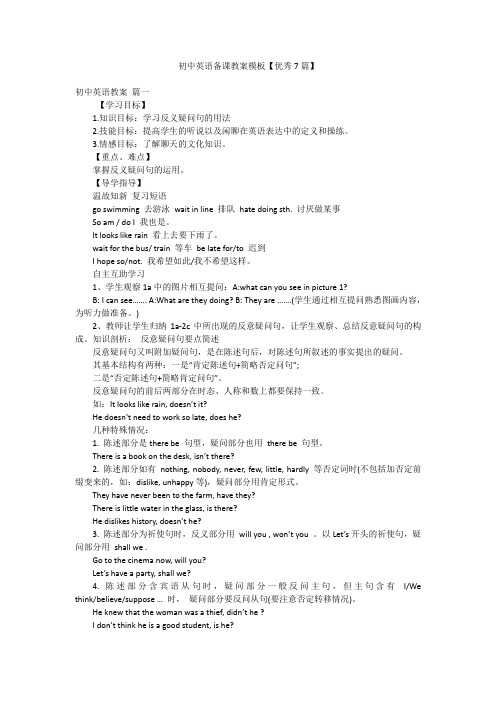
初中英语备课教案模板【优秀7篇】初中英语教案篇一【学习目标】1.知识目标:学习反义疑问句的用法2.技能目标:提高学生的听说以及闲聊在英语表达中的定义和操练。
3.情感目标:了解聊天的文化知识。
【重点、难点】掌握反义疑问句的运用。
【导学指导】温故知新复习短语go swimming 去游泳wait in line 排队hate doing sth. 讨厌做某事So am / do I 我也是。
It looks like rain 看上去要下雨了。
wait for the bus/ train 等车be late for/to 迟到I hope so/not. 我希望如此/我不希望这样。
自主互助学习1、学生观察1a中的图片相互提问:A:what can you see in picture 1?B: I can see……. A:What are they doing? B: They are …….(学生通过相互提问熟悉图画内容,为听力做准备。
)2、教师让学生归纳1a-2c中所出现的反意疑问句,让学生观察、总结反意疑问句的构成。
知识剖析:反意疑问句要点简述反意疑问句又叫附加疑问句,是在陈述句后,对陈述句所叙述的事实提出的疑问。
其基本结构有两种:一是“肯定陈述句+简略否定问句”;二是“否定陈述句+简略肯定问句”。
反意疑问句的前后两部分在时态、人称和数上都要保持一致。
如:It looks like rain, doesn’t it?He doesn’t need to work so late, does he?几种特殊情况:1. 陈述部分是there be 句型,疑问部分也用there be 句型。
There is a book on the desk, isn’t there?2. 陈述部分如有nothing, nobody, never, few, little, hardly 等否定词时(不包括加否定前缀变来的,如:dislike, unhappy等),疑问部分用肯定形式。
中学英语教案模板英文3篇

中学英语教案模板英文3篇中学英语教案模板英文1Unit 16 Lesson 63Hello, everyone. Today I’m very pleased to have an opportunity to talk about some of my teaching ideas. My topic is life in the oceans taken from Lesson 63 of Unit 16 in SEFC(2). It is made up of four parts.Part 1 My understanding of this lessonThe analysis of the teaching material:This lesson is a reading passage. It plays a very important part in the English teaching of this unit. Lesson 62 and Lesson 63 are a whole unit. By studying Lesson 63, Ss can improve their reading ability, learn more about the sea and the life in the oceans. At the same time, we should get the students to understand some difficult sentences to prehend the passage better. The Ss should do some listening, speaking and writing, too. Of course, the Ss should receive some moral education. Let the Ss understand the sea better, love the sea and save the sea and the life of the sea.Teaching aims:1. Knowledge aim: Understand the main idea of the text.2. Ability aim: Retell the text in their own words.3. Emotional aim: Make the Ss love the life of the sea and do something to stop it being polluted.Key points / Teaching important points:How to understand the text better.Teaching difficult points:1. Use your own words to retell the text.2. Discuss the pollution of the sea and how to save the sea.Something about the Ss:1. The Ss have known something about the sea and sea life through the Internet and other ways.2. They are lack of vocabulary.3. They don’t often us e English to express themselves and municate with others.4. Some Ss are not active in the class because they are afraid of making mistakes.Part 2 My teaching theories, methods and aidsBefore dealing with this lesson, I’ll do my best to carry out the following theories: Make the Ss the real masters in class while the teacher himself acts as director; Combine the language structures with the language functions; Let the students receivesome moral education while they are learning the English language.Teaching method:Double activities teaching methodQuestion-and-answer activity teaching methodWatch-and-listen activityFree discussion methodPair work or individual work methodTeaching aids:1. a projector2. a tape recorder3. multimedia4. the blackboardPart 3. Teaching steps / proceduresI have designed the following steps to train their ability of listening, speaking, reading and writing, especially reading ability.The entire steps are:Greetings, Revision, Lead-in and preparation for reading, Fast reading(scanning), Listening, Intensive reading, Preparation for details of the text, Consolidation, Discussion, Homework Step 1 GreetingsGreet the whole class as usual.Step 2. Revision1. Ask students some questions to revise the last lesson(show them on the screen).a. How much salt do the oceans contain per thousand parts of water?(35 parts of salt. 3.5% by weight)B. What is coral? Why are corals not found in deep water?c. Why is the Dead Sea called the Dead Sea?2. Check the homework(made a survey about the sea or sea life by surfing the Internet or asking for help from other people). Through this part we can consolidate what they studied yesterday, municate with others about their survery results and prepare for the new lesson.Step 3. Lead-in and preparation for readingShow them some pictures and let them talk each other, and then use the pictures about sea and life in the oceans to learn new words, for example, Antarctica, huge whale, sperm whale, squid and so on.Purpose: Arouse the students’ interest of study.Bring in new subject: Life in the oceans.Step 4. Fast readingRead the passage as quickly as they can. I show the questions on the screen and let them get the main idea of each paragraph:1. Why can living things live in such oceans around the Antarctica?2. What does the whale feed on?3. What is the difference between the sperm whale and other whales?Method: Read the text individually, use question—and—answer activity.Purpose: Improve the students’ reading ability.Understand the general idea of each paragraph.Step 5. Listening(book closed)2. True or false exercise.(on the screen)Train the Ss’ listening ability and prepare for later exercises.Step 6. Intensive readingRead the passage carefully again and answer some detailed questions on the screen.1. How much does a whale eat at a time?2. Do all the whales feed on small fish?3. How deep can a sperm whale dive?It is also called depth reading or study reading. It meansreading for detailed information.Purpose: Further understand the text (Train further reading ability) to find out some different sentences and details of the text.Step 7. Preparation for details of the text on the screen1. .its heart slows to half its normal speed.Slow-v. to e / make slower.2. ing sound wavePresent participle used as adverbial.3. provide sth. for sb.Provide sb. with sth.4. at a time: each time5. grow to a length of...Purpose: Train the Ss’ ability of understanding and using laguage.Step 8. Consolidation1. Find out the topic sentences.2. Retell the passage according to the topic sentences.Purpose: I want to know if my students understand the whole text really and if they master what I mean to tell them in this class. What’s more, I want to let them have the ability of introducing and analyzing expression. At the same time, I will write down thetopic sentences on the blackboard according to what the students find, so they can retell it easily.Step 9. DiscussionShow them some pictures about the polluted sea and many living things which are in danger and ask them: What are their opinions about it? In order to let them have free choice, I give them another topic: The sea is being polluted. What should they do?Purpose: I mean to give them emotional education. I give them multi-media pictures to arouse their interest of study and their love for life. I mean to make them realize: The sea is in danger!I teach them to do their best to help it and do something from now on. Everyone should do something to love and protect our home.Step 10. HomeworkWrite an article Saving the sea. I want to improve the ability of their writing. At the same time, train the ability of do-it-yourself and looking up the information by themseleves.Part 4. Blackboard designUnit 16 Lesson 63Topic Sentences:1. Some living things can live in Antarctica.(what)2. The whale feeds on small fish.(what)3. The sperm whale feeds on squid.(difference)Discussion:1. The whales are in danger. What’s your opinion about it?2. The sea is being polluted. What should we do?In my opinion, the blackboard design can reflect the teacher’s ability of mastering the text and leading the students to master the text easily.In this text, the design is not easy to write. I write the topic sentences on the blackboard in order to tell the students that this is of the importance in this class. The discussion is of the difficulty.I want to make the design inductive, instructive and artistic.中学英语教案模板英文中学英语教案模板英文2__G __RESI、Warming-upStep one:Let’s the student listen to the tape.And review some adj. about weather.Eg:warm,cool,hot,cold.Let the students do actions while listening.Step two:Do an exercise.The teacher will ask some questions about the listen test.It's about part B read and write in grade five.Eg:What's your favourite 。
中小学英语教案模板【优秀6篇】
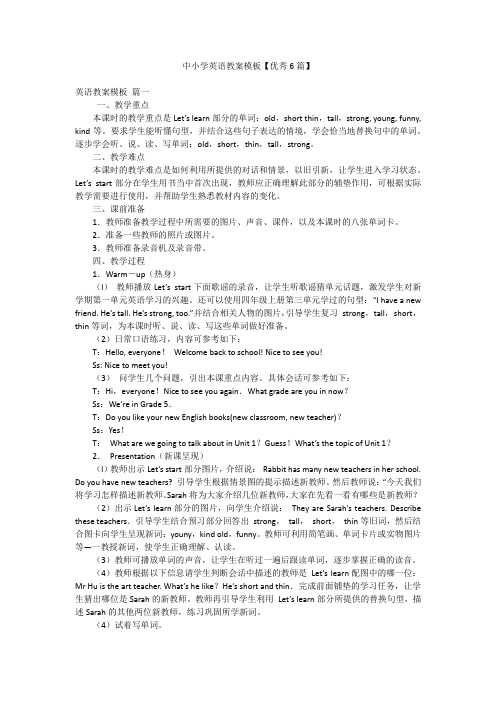
中小学英语教案模板【优秀6篇】英语教案模板篇一一、教学重点本课时的教学重点是Let’s learn部分的单词:old,short thin,tall,strong, young, funny, kind等。
要求学生能听懂句型,并结合这些句子表达的情境,学会恰当地替换句中的单词。
逐步学会听、说、读、写单词:old,short,thin,tall,strong。
二、教学难点本课时的教学难点是如何利用所提供的对话和情景,以旧引新,让学生进入学习状态。
Let’s start部分在学生用书当中首次出现,教师应正确理解此部分的辅垫作用,可根据实际教学需要进行使用,并帮助学生熟悉教材内容的变化。
三、课前准备1.教师准备教学过程中所需要的图片、声音、课件,以及本课时的八张单词卡。
2.准备一些教师的照片或图片。
3.教师准备录音机及录音带。
四、教学过程1.Warm-up(热身)(l)教师播放Let’s start下面歌谣的录音,让学生听歌谣猜单元话题,激发学生对新学期第一单元英语学习的兴趣。
还可以使用四年级上册第三单元学过的句型:“I have a new friend. He’s tall. He’s strong, too.”并结合相关人物的图片,引导学生复习strong,tall,short,thin等词,为本课时听、说、读、写这些单词做好准备。
(2)日常口语练习,内容可参考如下:T:Hello, everyone!Welcome back to school! Nice to see you!Ss: Nice to meet you!(3)问学生几个问题,引出本课重点内容。
具体会话可参考如下:T:Hi,everyone!Nice to see you again.What grade are you in now?Ss:We’re in Grade 5.T:Do you like your new English books(new classroom, new teacher)?Ss:Yes!T:What are we going to talk about in Unit 1?Guess!What’s the topic of Unit 1?2.Presentation(新课呈现)(l)教师出示Let’s start部分图片,介绍说:Rabbit has many new teachers in her school. Do you have new teachers? 引导学生根据情景图的提示描述新教师。
初中英语教案模板【精选6篇】
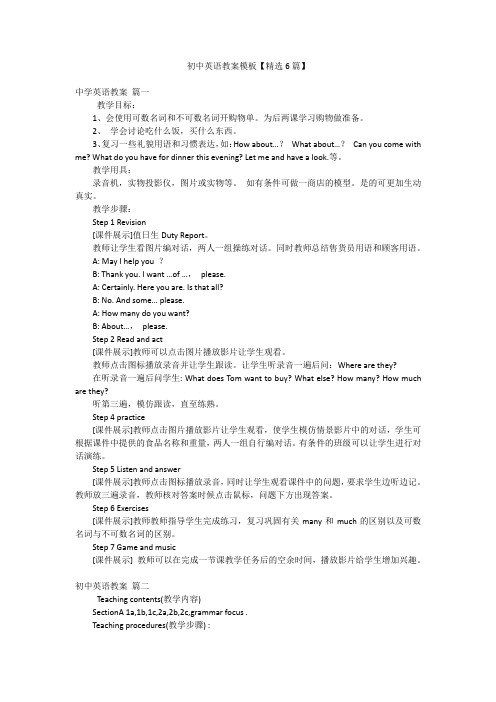
初中英语教案模板【精选6篇】中学英语教案篇一教学目标:1、会使用可数名词和不可数名词开购物单。
为后两课学习购物做准备。
2、学会讨论吃什么饭,买什么东西。
3、复习一些礼貌用语和习惯表达,如:How about…?What about…?Can you come with me? What do you have for dinner this evening? Let me and have a look.等。
教学用具:录音机,实物投影仪,图片或实物等。
如有条件可做一商店的模型。
是的可更加生动真实。
教学步骤:Step 1 Revision[课件展示]值日生Duty Report。
教师让学生看图片编对话,两人一组操练对话。
同时教师总结售货员用语和顾客用语。
A: May I help you ?B: Thank you. I want …of …,please.A: Certainly. Here you are. Is that all?B: No. And some… please.A: How many do you want?B: About…,please.Step 2 Read and act[课件展示]教师可以点击图片播放影片让学生观看。
教师点击图标播放录音并让学生跟读。
让学生听录音一遍后问:Where are they?在听录音一遍后问学生: What does Tom want to buy? What else? How many? How much are they?听第三遍,模仿跟读,直至练熟。
Step 4 practice[课件展示]教师点击图片播放影片让学生观看,使学生模仿情景影片中的对话,学生可根据课件中提供的食品名称和重量,两人一组自行编对话。
有条件的班级可以让学生进行对话演练。
Step 5 Listen and answer[课件展示]教师点击图标播放录音,同时让学生观看课件中的问题,要求学生边听边记。
英语教学教案模板5篇

英语教学教案模板5篇英语教学教案模板篇1一、教学资料:module 9 happy brithday unit 1 can i some soup sweets?二、教学目标认知目标1、巩固掌握食物类词汇。
2、掌握句型“can i have some soupsweetsbread?”本事目标能运用“can i have some?”询问他人自我是否能够得到某种食物,并掌握回答:yes,you cansorry,you can′t情感目标让学生经过对课文资料的表演,增强学习的信心,调动学生的学习兴趣。
三、教学重难点重点能用句型“can i have some?””询问他人自我是否能够得到某种食物,并掌握回答:yes,you cansorry,you can′t。
难点句型运用中,与can you?句型混淆。
四、教学设计step1 warming(热身活动)1、师生互相问好,教师询问是否有人当天过生日或是最近过生日2。
播放录音,全班跟着齐唱英文歌曲’happy birthday to you【设计意图】利用歌曲激发学生的学习兴趣,活跃课堂气氛,同时也拉近了师生的距离,促进了师生的交流。
step2 revision and presentation(新课呈现)1、教师告诉学生amy生日快到了,大家友什么计划为她开一个生日party,事先要准备party上的食物,请同学们帮忙准备一下,在事先准备好的白纸上画出认为party所需准备的食物。
2、教师请学生说出画的是什么食物,多学生语音进行纠正。
3、教师告诉学生:ms smart要为amy准备的食物没有那么多,只需要soup(汤),sweets(糖果),bread(面包),biscuit(饼干),cake (面包),fruit(水果),请画有其中之一种食物的学生举手示意。
4、教师逐一出示soup,sweets,bread,biscuit,cake,fruit六幅图片并教学生读。
英语教案模板10篇
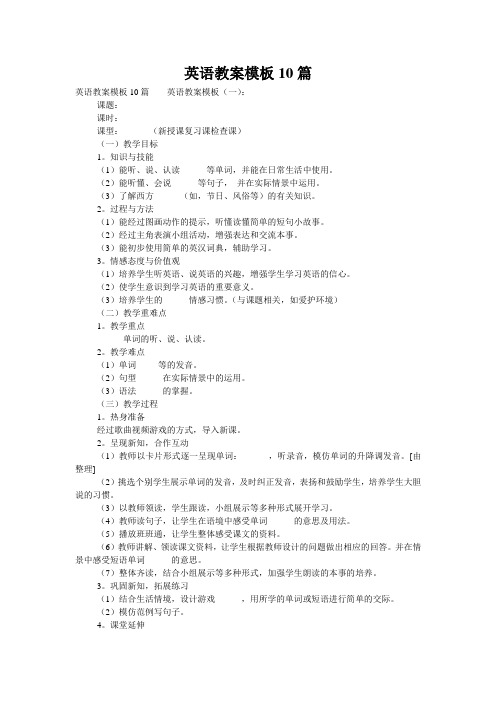
英语教案模板10篇英语教案模板10篇英语教案模板(一):课题:______课时:______课型:______(新授课复习课检查课)(一)教学目标1。
知识与技能(1)能听、说、认读______等单词,并能在日常生活中使用。
(2)能听懂、会说______等句子,并在实际情景中运用。
(3)了解西方______(如,节日、风俗等)的有关知识。
2。
过程与方法(1)能经过图画动作的提示,听懂读懂简单的短句小故事。
(2)经过主角表演小组活动,增强表达和交流本事。
(3)能初步使用简单的英汉词典,辅助学习。
3。
情感态度与价值观(1)培养学生听英语、说英语的兴趣,增强学生学习英语的信心。
(2)使学生意识到学习英语的重要意义。
(3)培养学生的______情感习惯。
(与课题相关,如爱护环境)(二)教学重难点1。
教学重点______单词的听、说、认读。
2。
教学难点(1)单词_____等的发音。
(2)句型______在实际情景中的运用。
(3)语法______的掌握。
(三)教学过程1。
热身准备经过歌曲视频游戏的方式,导入新课。
2。
呈现新知,合作互动(1)教师以卡片形式逐一呈现单词:______,听录音,模仿单词的升降调发音。
[由整理](2)挑选个别学生展示单词的发音,及时纠正发音,表扬和鼓励学生,培养学生大胆说的习惯。
(3)以教师领读,学生跟读,小组展示等多种形式展开学习。
(4)教师读句子,让学生在语境中感受单词______的意思及用法。
(5)播放班班通,让学生整体感受课文的资料。
(6)教师讲解、领读课文资料,让学生根据教师设计的问题做出相应的回答。
并在情景中感受短语单词______的意思。
(7)整体齐读,结合小组展示等多种形式,加强学生朗读的本事的培养。
3。
巩固新知,拓展练习(1)结合生活情境,设计游戏______,用所学的单词或短语进行简单的交际。
(2)模仿范例写句子。
4。
课堂延伸(1)听录音,读、背单词、句子。
(2)在生活中使用所学单词、句子。
高中英语教案模板全英文(共7篇)
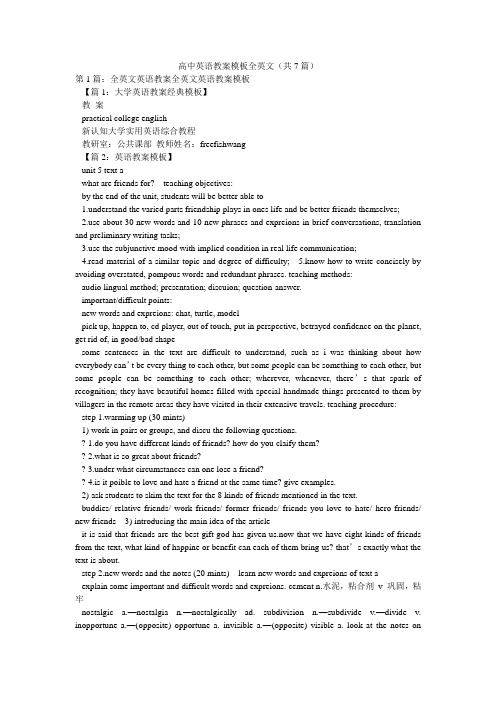
高中英语教案模板全英文(共7篇)第1篇:全英文英语教案全英文英语教案模板【篇1:大学英语教案经典模板】教案practical college english新认知大学实用英语综合教程教研室:公共课部教师姓名:freefishwang【篇2:英语教案模板】unit 5 text awhat are friends for? teaching objectives:by the end of the unit, students will be better able to1.understand the varied parts friendship plays in ones life and be better friends themselves;e about 30 new words and 10 new phrases and expreions in brief conversations, translation and preliminary writing tasks;e the subjunctive mood with implied condition in real life communication;4.read material of a similar topic and degree of difficulty;5.know how to write concisely by avoiding overstated, pompous words and redundant phrases. teaching methods:audio lingual method; presentation; discuion; question-answer.important/difficult points:new words and expreions: chat, turtle, modelpick up, happen to, cd player, out of touch, put in perspective, betrayed confidence on the planet, get rid of, in good/bad shapesome sentences in the text are difficult to understand, such as i was thinking about how everybody can’t be every thing to each other, but some people can be something to each other, but some people can be something to each other; wherever, whenever, there’s that spark of recognition; they have beautiful homes filled with special handmade things presented to them by villagers in the remote areas they have visited in their extensive travels. teaching procedure:step 1.warming up (30 mints)1) work in pairs or groups, and discu the following questions.? 1.do you have different kinds of friends? how do you claify them?? 2.what is so great about friends?? 3.under what circumstances can one lose a friend?? 4.is it poible to love and hate a friend at the same time? give examples.2) ask students to skim the text for the 8 kinds of friends mentioned in the text.buddies/ relative friends/ work friends/ former friends/ friends you love to hate/ hero friends/ new friends 3) introducing the main idea of the articleit is said that friends are the best gift god has given us.now that we have eight kinds of friends from the text, what kind of happine or benefit can each of them bring us? that’s exactly what the text is about.step 2.new words and the notes (20 mints) learn new words and expreions of text aexplain some important and difficult words and expreions. cement n.水泥,粘合剂v 巩固,粘牢nostalgic a.—nostalgia n.—nostalgically ad. subdivision n.—subdivide v.—divide v. inopportune a.—(opposite) opportune a. invisible a.—(opposite) visible a. look at the notes onpage 1161.marion wink: poet, eayist, and regular commentator on national public radio’s.the author made up the capitalized expreions in the text such as “faraway friend,” “relative friend,” which would make no sense at all out of context, with the latter in particular.2.you quit doing drugs, you’re not such good friends with your dealer anymore: this is not meant to be taken seriously.poeion or sale of illegal drugs can result in long prison terms.step 3.key points (60 minutes)? 1.cry on sb.’s shoulder: get sympathy from someone when you tell them your problems 向某人诉苦以寻求抚慰(或同情)e.g.at least she hadn’t cried on his shoulder again.if you ever need a shoulder to cry on, just call me.? 2.in return (for sth.): as payment or reward for something作为回报或回报e.g.he is always helping people without expecting anything in return.we offer an excellent all-round(全面的,多角度的)education to our students.in return, we expect students to work hard. ? 3.they hold out through innumerable crises before...: they are alwaysreliable(可靠的,可信信赖的)and nice when you are in difficult times even though they don’t like what you are doing... ? 4.while so many family relationships are tinged with guilt and obligation:while so many people may feel something of a sense of guilt orresponsibility in dealing with family relationships...? pany goip, once an infallible(绝对可靠的)source ofentertainment, soon awkwardly accentuates the distance between you: office chat used to be an effective way of amusement for you; however, it makes you feel uneasy since you do not work together anymore and therefore increases the feeling of distance between you.? 6.work friends share certain memories which acquire a nostalgic glowafter about a decade:memories of your work friends makes you happy after ten years, so yousomehow wish that you could return to those days.? 7.dead end: a street with no way out at one end or a situation from which nomore progre in poiblee.g.he realized that the job at which he had been aiming all these yearsseemed to him to be a dead end. he thinks they have reached an evolutionary(逐渐发展的,演变的)dead end.? 8.when you feel you’ve hit a dead end, come to a confusing fork in theroad, or gotten lost in some cracker-box subdivision of your life:whenever you feel helple, confused or at a lo(困惑的,手足无措的)in the complicated journey of your life...notice that “cracker-box division” is not a general expreion, but is rather made up by the author.cracker: 薄脆饼干;咸饼干sth.: formal owning or having obtained something from somewhere 占有(或拥有)某物e.g.she was found in poeion of stolen goods.how did the painting come into your poeion (=how did you get it) ? ? 10.to death: informal used to emphasize that a feeling or emotion is very strong? be bored / scared / frightened etc.to deathshe was scared to death of what might happen next.i’m absolutely sick to death of it (=very angry, bored, or unhappy about something) .? bore / scare / love etc.somebody to deathhe drove at a speed which frightened leonora to death.she used to worry me to death.? 11.make me/you sick: spoken a) make you feel very angrye.g.people like you make me sick!b) indicate a feeling of jealousy — used humorouslye.g.you make me sick with your “expenses paid” holidays!? 12.wherever, whenever, there’s that spark of recognition(认识):when you meet a “new friend” for the first time you instantly feel a connection with each other. step 4.aignment (5 minutes)1.read the article repeatedly and try to remember the new words and expreions in text a2.finish the study and practice on page 118-130.the teaching plan of unit 5 what are friends for?(college english 2) english department sun xiaofang【篇3:全英文英语阅读课教案模板】阅读课教案school__ number3 middle school____junior or senior section _junior__ cla ____3____ grade _1_______size ______45__ time_40_______date __2009-12-28____ materials __go for it______type of leon _reading ____ contents: 1.vocabulary: some nouns about furniture and some daily use things: table, bed, dreer, bookcase, sofa, chair, backpack, books, keys, baseball, drawer, plant. some prepositions of place: on, in, under2.structure: where is (where’s)…?it is (it’s) in/on/under…where are…?they are (they’re) in/on/under… where’s/where’re…?i don’t know.is it /are they on/in/under… ?no, it isn’t./they aren’t./ yes, it is./they are.3.1) dialogue: where’s the bag?i don’t know.is it on the dreer?no, it isn’t.where are my books?i don’t know.are they on the bed?no, they’re not.2)writing: ask, gue and write objectives:1.instructional objectives (language knowledge and language skills)1) to promote students’vocabulary development (table, bed, dreer,bookcase, sofa, chair, backpack, books, keys, baseball, drawer, plant.…)2) to promote students’reading skills a) prediction b) skimming3) to promote students’oral english4) to develop students’writing skill cational objectives (affect, learning strategy and cultural awarene)1) to develop students’ability to communicate with others to get information2) to build students’confidence3) to make students learn to cooperate with others 3.personal objectives:1) to develop teacher’s ability of claroom management focal points: a: the nouns. b: prepositions of place c: where- question andd: answers to “is the… in/on/under the …?”;difficult points: a: use the prepositions to describe position of thingsb: use the where-question and is it-/are they -question to ask things’positionaids: ppt, blackboard, chalk … pr ocedures and time allotment1.getting students ready for learning( mins) 1) greetings: good morning everyone! 2) routine task: duty report2.revision: use some pictures to review the vocabulary ( table, bed, dreer, bookcase, sofa, chair, backpack, books, keys, baseball, drawer, plant, on, in, under) and sentence structure:where is (where’s)…?it is (it’s) in/on/underwhere are…?they are (they’re) in/on/under… 3.pre-reading :step1: vocabulary and some phrases learningtask: look at the conversation between them and gue the meaning of the sentences in red.( using the conversation between liu qian and a xin to show those phrases to the students in order to learn them by the context; because the sentence structure in the conversation is those they have learnt) (… mins)此步骤包含词汇、语法教学等 4.while-reading 5.post-reading(… mins)1) oral work 2) written work 6.aigning homework1) conclusion: a: vocabularyb: sentence patterns: where is (where’s)…?it is (it’s) in/on/under…where are…?they are (they’re) in/on/under…where’s/where’re…?i don’t know.is it /are they on/in/under… ?no, it isn’t./they aren’t./ yes, it is./they are. 2) homework: ask, gue and writelet your partner to ask as well as gue where your things are in your room.write down your conversation by using the following sentence patterns:a: where’s/where’re your…? b: you can gue.a: i don’t know.is it /are they on/in/under… ?b: no, it isn’t./they aren’t.yes, it is./they are.…self-evaluation第2篇:全英文幼儿园英语教案全英文幼儿园英语教案【篇1:幼儿园英语教案】幼儿园英语教案-好吃的水果一、活动内容:《好吃的水果》二、活动目的:1、在游戏中学习英语单词,如:apple、banana、orange、pear、grape、peach等等。
中学英语教案-模板合集

Encourage the students
1. To predict what the text will be about by reading the title
by askingthe students to read for details.
2. Tofind out how to write a postcard by reading the post ard.
2.
知
识
新
授
Vocabulary and sentence structure
1.Words guessing
2.Say what the people in the photos are doing.
Students are supposed to match the new words with picture in Part 1 on Page 4, and to be able to read the new words, and then to know the meanings of the words.
Board design
(板书设计)
Unit 2 They're going to the opera.
Key points:watching a ballet.
put on,at this moment,leave work,Difficult sentence:
at home, get dressed,look at,Some are going to the opera orwatching a ballet.
Teaching Tool
(教具)
1。PPT player&mantle
初三英语教案模板5篇

初三英语教案模板5篇初三英语教案模板5篇作为一位无私奉献的人民老师,就有可能用到教案,教案有利于教学水平的提高,有助于教研活动的开展。
那么你有了解过初三英语教案吗?以下我在这给大家整理了一些初三英语教案模板,盼望对大家有关心!初三英语教案模板(精选篇3)教学目标1、能够圈出相同的字母,娴熟认读26个英文字母。
2、数出文具单词的数量,听说认读AB部分Let’s learn的8个文具的单词:crayon,pencil,pen,eraser,ruler,bag,book,pencil-box。
教学重难点教学重点:1、字母的认读;2、听说认读8个文具的单词:crayon,pencil,eraser,ruler,bag,book,pen,pencil box。
教学难点:较精确读出各单词,尤其是crayon和eraser两个单词的发音。
教学工具ppt课件教学过程ⅠGreetingsT: Hello,boysand girls. Ss: Hello, Miss Ren.T: Hello,I’mMiss Ren. S: Hello,I’m....T: Hello,What’syour name? S: My name’s.....ⅠPresentation1、I have somefriends.Let’s say hello to them.通过与字母打招呼,复习26个字母。
2、We have somany new friends. Are you happy? Let’s sing together.师生齐唱字母歌,复习巩固字母。
3 、the letter“a”made some new friends.He has a show for us. 通过字母秀的形式引出文具单词,并通过短语Showme your..... Open your.... Close your.... Carry your....操练单词。
初中英语教案设计模板(共5篇)

初中英语教案设计模板〔共5篇〕第1篇:初中英语教案设计初中英语教案设计Unit 1 Have you ever eerd a petition? 教学内容:1.让学生学习和掌握如今完成时的用法 2.教学生学习新词汇,句型和语法3.解释并举例说明如今完成进展时主要形式【have/hasV-ed】教学目的1.词汇和短语experience,ever,petition,airport,capta-in ,country,take off,e true,more than e.g.2.关键句:Has she visited China before? -No,she hasn’t.But I sent her a DVD and she’s watchd it.Have you ever entered a petition? -No,I haven’t.What do you reakon? It sounds brilliant! 3.学习和掌握语法;The presentperfect tense 教学重点1.Words:cabin, stewad, reckon, brillnt2.Preposition:on ,in , 教学难点The present prefect tense[Have/has done] Has he visited China before?---No,he hasn’t.教学目的1.To learn new words2.Prectice listening and speaking3.Learning sentence 教学筹划Listening,reading explaining and practicing 教学流程第2篇:初中英语教案设计初中英语教案设计模版【篇1:初中英语教案模板】teaching planstudent: the students of grade 7学生:七年级teaching content: go for it ,students’ book of grade 7.unit 5, the title is why do you like pandas? 教学内容:人教版七年级第五单元,标题:你为什么喜欢熊猫?teaching hour: 20-30mins上课时间:20-30分钟teaching plan: 教学方案 i.teaching aims:教学目的1.learn and master new words, sentence patterns. 1.学习并掌握新单词,重点句型.2.enable the students to talk in english about describing the character of animals and the reason of love.学生会英语描绘动物的特点及喜欢的原因。
- 1、下载文档前请自行甄别文档内容的完整性,平台不提供额外的编辑、内容补充、找答案等附加服务。
- 2、"仅部分预览"的文档,不可在线预览部分如存在完整性等问题,可反馈申请退款(可完整预览的文档不适用该条件!)。
- 3、如文档侵犯您的权益,请联系客服反馈,我们会尽快为您处理(人工客服工作时间:9:00-18:30)。
(板书设计)
Unit 2 They’re going to the opera.
Key points:watching a ballet.
put on, at this moment, leave work,Difficult sentence:
at home, get dressed, look at,Some are going to the opera orwatching a ballet.
Complementarywords: supper, who
Difficult sentence: Some are going to the opera orwatching a ballet.
(Some are going to see an operaor watch a ballet.)
Ideas of design
1.Ask Ss to do some actions.
2.The others talk about what they are doing.
Some students would be asked to do some actions.Then the others talk about what they are doing.
Vocabulary: thing,restaurant,wash,start,hot dog.
Key points: put on, at this moment, leave work,
at home, get dressed, look at,
see you soon
Additional new words: supper, who
Aims of teaching
(教学目标)
1.To get information from reading material about what people are doing in different places.
2.To get to know how to write a postcard.
(教学内容)
Unit 2 They’re going to the opera.
Analysis of the teaching material
(教材分析)
The reading passage has so much information, and there are quite a few new words in it. This will help to improve students’ reading skill.
Post-task activity: Group work
Present their answers.
Summary
(情景回归/归纳总结)
Text explanation
Discuss the sentences in the text, and try to get familiar with the words and phrases.
Then ask students to finish part3 on page5.
Pre-task activity: Pair work
Read the title on Page 4 . Then discuss in pairs to guess what the text will talk about. After discussion, some students should be asked to tell the whole class about their guessing.
2.The others talk about what they are doing.
Some students would be asked to do some actions.
The others talk about what they are doing.
Presentation
(讲授新课)
教学目标
To get information from reading material about what people are doing in different places.
To get to know how to write a postcard.
教学重点r details.
Difficult sentence: Some are going to the opera or
watching a ballet.
(Some are going to see an opera
or watch a ballet.)
设计思路
Encourage the students to predict what the text will be about by reading the title ..
Basic Information
(基本信息)
Teacher(教师)
Stone
Type(课型)
New
Teaching material
(教材)
EEC Grade six(Book One)
Period(课时)
1 class
Teaching Model
(教学设计)
Contents of teaching
3.Then ask students to finish part3 on page5.
Pre-task activity: Pair work
Read the title on Page 4. Then discuss in pairs what the text will talk about. After discussion, some students should be asked to tell the whole class about their guessing.
While-task activity 1: Individual work
Read the text and underline the words.
While-task activity 2: Group work
Work in groups to complete Part 2/3 on P5.
板书(或课
件)设计
Unit 2 They’re going to the opera.
Teaching Tool
(教具)
1. PPT player & mantle
2. Cards
上课教师
Name
学生年级
初一
教材
《英语》(新标准)
课时
一课时
教 学 设 计
教学内容
Unit 2 They’re going to the opera.
教材分析
The reading passage has so much information, and there are quite a few new words in it. This will help to improve students’ reading skill.
3.
情
景
操
练
Ask the students to read the title on Page 4 and Part 2 on Page 5, then guess what will the text talk about.
After that, ask students to read and find out information .
Post-task activity: Group work
Present their answers.
4.
情
景
回
归
Text explanation
Discuss the sentences in the text, and try to get familiar with the words and phrases.
While-task activity 1: Individual work
Read the text and underline the words.
While-task activity 2: Group work
Work in groups of 4-6 to complete Part 2and3 on Page 5.
Emphasis on teaching
(教学重点)
Reading ability: read for details.
Vocabulary: thing,restaurant,wash,start,hot dog.
Key points: put on, at this moment, leave work,at home, get dressed, look at,see you soon
Vocabulary and sentence structure
1.Words guessing
2.Say what the people in the photos aredoing.
Students are supposed to match the new words with picture in Part 1 on Page 4, and to be able to read the new words, and then to know the meanings of the words.
Practice
(情景操练/巩固练习)
1.Ask the students to read the title on Page 4&Part 2 on Page 5, then guess what will the text talk about.
